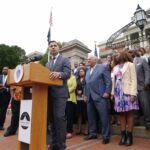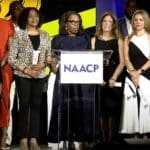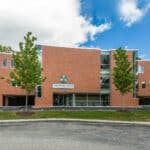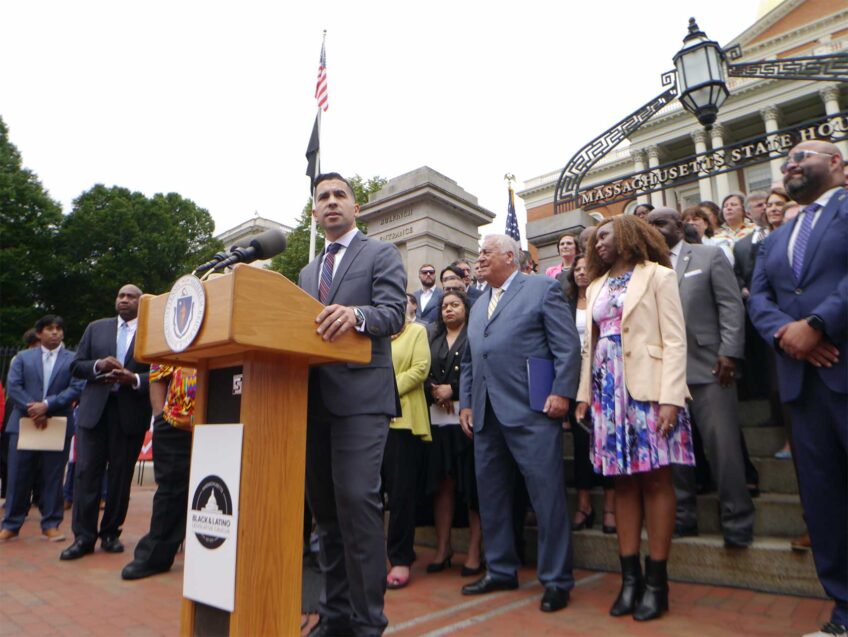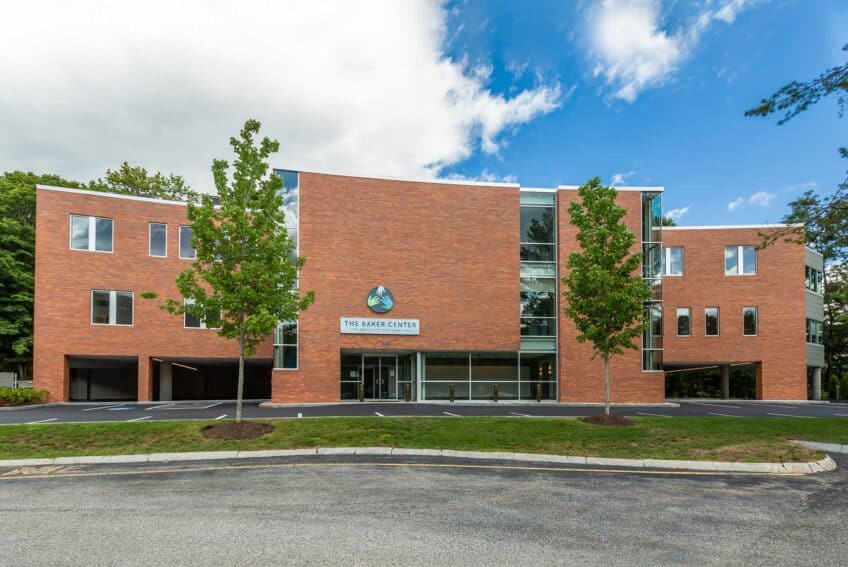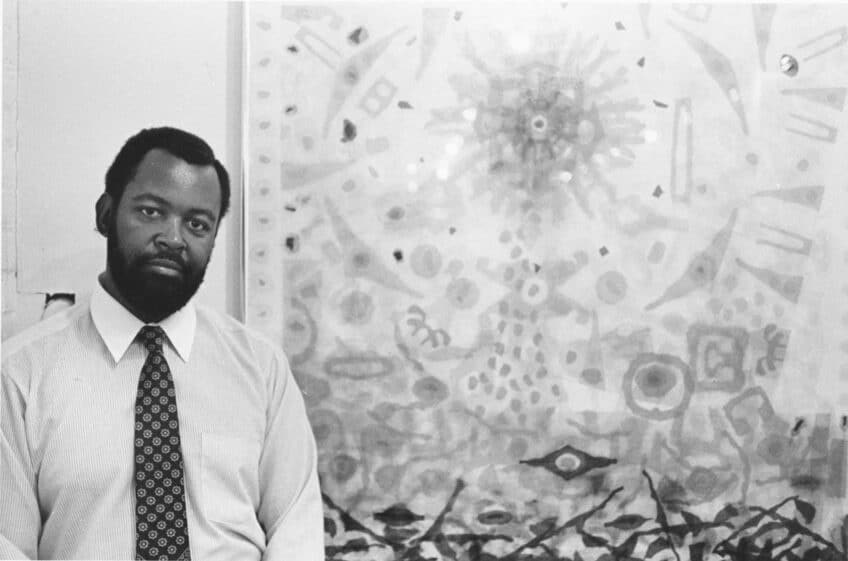With election season approaching, Dunk the Vote pushes for increased voter registration
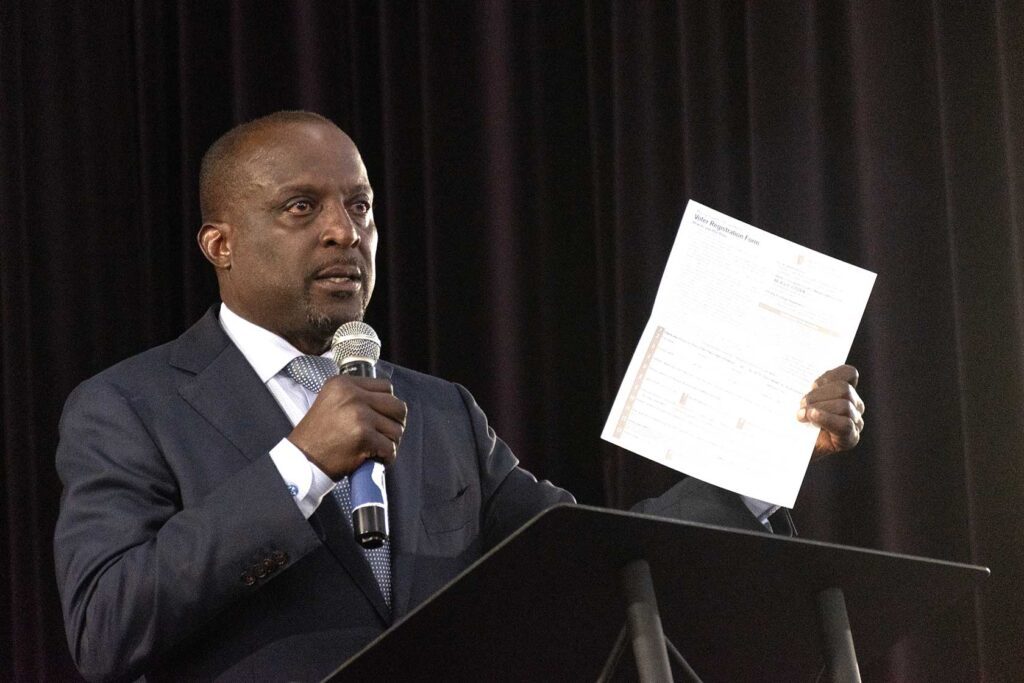
Ron Bell may not be a pastor, but ahead of the service at the Greater Love Tabernacle Church Aug. 11, he delivered his own sermon to the congregation with a call to action: Register to vote.
It’s a message he’s used to delivering. Bell’s organization, Dunk the Vote, has been leading voter registration efforts in Boston since the group’s founding in 1992.
Now, with a state preliminary election approaching Sept. 3 and the presidential election in November, Bell is sharing his message again — in crunch time as the registration deadline for the preliminary election is approaching on Aug. 24.
Much of the work Dunk the Vote does has a local bent to it. Bell pointed to the ability of local officials to have a role in fixing things like potholes and quality of life issues or moderating things like local law enforcement.
“It’s the small things that we realized we needed to bring into the community,” Bell said.
City and state elections are the ones that, broadly, tend to have a greater day-to-day role in the life of voters, said Dawn Duncan, who is a senior advisor for the group and whose organization Circle of Nations, Inc. serves as the fiscal sponsor of Dunk the Vote.
“You voting actually can make an impact on the things that happen downtown,” Duncan said. “The people who you elect are responsible for those kinds of day-to-day services that impact your life.”
But that work faces additional challenges — it’s often harder to get voters to the polls for state and municipal elections.
In the past two decades, voter turnout for state elections hovered around 50% to 60%, while, in each of the presidential elections pulled in upward of 70% of registered voters, per state data.
According to city records, in municipal elections during that same span, voter turnout was even lower. Percentages varied more widely, but never reached higher than about 38% of eligible voters. In some elections, it was under 14%.
But, at the heart of the work is the philosophy that every voter matters. Bishop William E. Dickerson II, senior pastor at Greater Love Tabernacle and a supporter of Dunk the Vote, pointed to the 2019 election of at-large City Councilor Julia Mejia who, following a recount, was elected to her seat by a margin of one vote..
“There are people who feel that they have no reason to vote, then they get educated on the importance of voting and understand that their one vote does matter,” he said.
That focus has produced a local voter’s guide, with information on which local officials represent what part of Boston, which city departments exist and do what, resources like the city’s 311 line to request city services and information about when and how to vote. At the Greater Love Tabernacle service Aug. 11, Bell tucked voter registration forms in between the pages of the guides he handed out.
Development of the guide came out of a series of conversation the group held with community members about why they did or didn’t vote as part of the Real Talk for Change effort from the MIT Center for Constructive Communication.
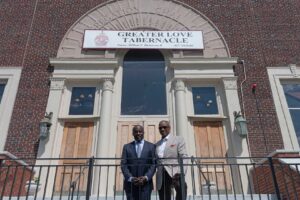
Dunk the Vote founder Ron Bell (left) and Bishop William Dickerson III pose for a photo outside Greater Love Tabernacle Church. BANNER PHOTO
“I think from a lot of the feedback we got from that process, we thought, ‘Wow, there’s a lot of people who aren’t really engaged.’ … That helped lead to the creation of the guide as a really concrete manifestation of content from those conversations,” Duncan said.
For some, Dunk the Vote’s work has increasing heft as the national political landscape grows increasingly polarized. Increased tension and fighting between the left and right are making the electorate feel increasingly apathetic about voting, said Dickerson, making reminders to vote all the more important.
“Dunk the Vote is getting is people engaged, getting people excited about the process, and doing what they did from the beginning that caused them to vote to make the impact they have made throughout the Greater Boston area,” Dickerson said. “We need that kind of mobilization and motivation, because right now, people are very frustrated with the whole electoral process.”
Even in its local focus, the effort doesn’t shy away from having a broad scope, Duncan said. The approach, she said, isn’t piecemeal, but looks at the big picture.
“It’s really true civic engagement, but it also kind of bridges the grassroots all the way up to the policy stuff,” she said.
But it starts with a focus on getting out onto the streets, with visits to churches — like his announcement at Greater Love Tabernacle — or to colleges, community-based organizations, civil rights groups and corporations — together, Bell’s so-called 5C model.
“We believe the best organizing is having boots on the ground,” Bell said. “When you look at the elections that are going on now … it’s mostly social media, and social media has its place. It’s quick and efficient, but at the same time, it’s not effective as knocking on doors, meeting people.”
The group was formed in the wake of Charles Stuart’s murder of his pregnant wife in 1989 and in the wake of the racial profiling that resulted from Stuart’s false allegations that a Black man had committed the killing.
In response, Bell, then the executive director of the Mission Hill Community Centers, started running basketball tournaments as a way to bring the community together and register people to vote.
The events became one-stop-shops, with small businesses getting opportunities for sales and local institutions offering basic health services like blood pressure checks.
In the work, his goal was to push back on elected officials who failed to stand up for Boston’s Black communities as police stopped Black men in the streets to strip search them.
Some of those issues have hanged, he said, but others remain the same.
“We met people where they were, organizing one-on-one and dealing with issues that were important to them,” Bell said. “We took that anger and turned it into voter registration and turnout, and then you started to see some changes as it relates to resources being poured into the center and to the community.”
Dickerson said the group was an important effort to reengage a community feeling apathetic and frustrated in the wake of the tragedy.
He lauded the community change the group’s efforts have generated.
“It’s been wonderful because it’s caused a certain level of interest in voting that was not there before,” Dickerson said. “It’s also engaged new voters, and it taught young people about civic engagement and what it means to vote and support their communities.”
And the reach of that work has expanded. What began as a local effort has come to focus on other cities surrounding Boston as community members have left due to pressures like gentrification.
“Boston is bigger than just the 24 neighborhoods,” Bell said. “The neighbors are gone. They’re gone to Brockton; they’re gone to Randolph, so gentrification is another issue.”
The group has also had activity across the country, including in states like Ohio, North Carolina, California and Florida.
For Bell, getting people to vote is a public health emergency — it’s a concept that the group started using during the COVID-19 pandemic, but one he said is just as pertinent today.
“We wanted to make sure people knew the importance of their health and their vote,” Bell said.
For Duncan, who, separately, has a master’s in public health, said that voting in local elections can have an important role in addressing issues like health disparities, Black maternal morbidity, reproductive rights, access to health care, as well as other social factors that impact community health, like access to housing.
“[During the pandemic] having people being able to vote was kind of a big thing,” Duncan said. Today, there’s still, in some ways, voting being a public health emergency to me in the sense that because policy — what ultimately results from voting — is so interconnected with [public health] that it’s really important that we’ll understand the issues.”

